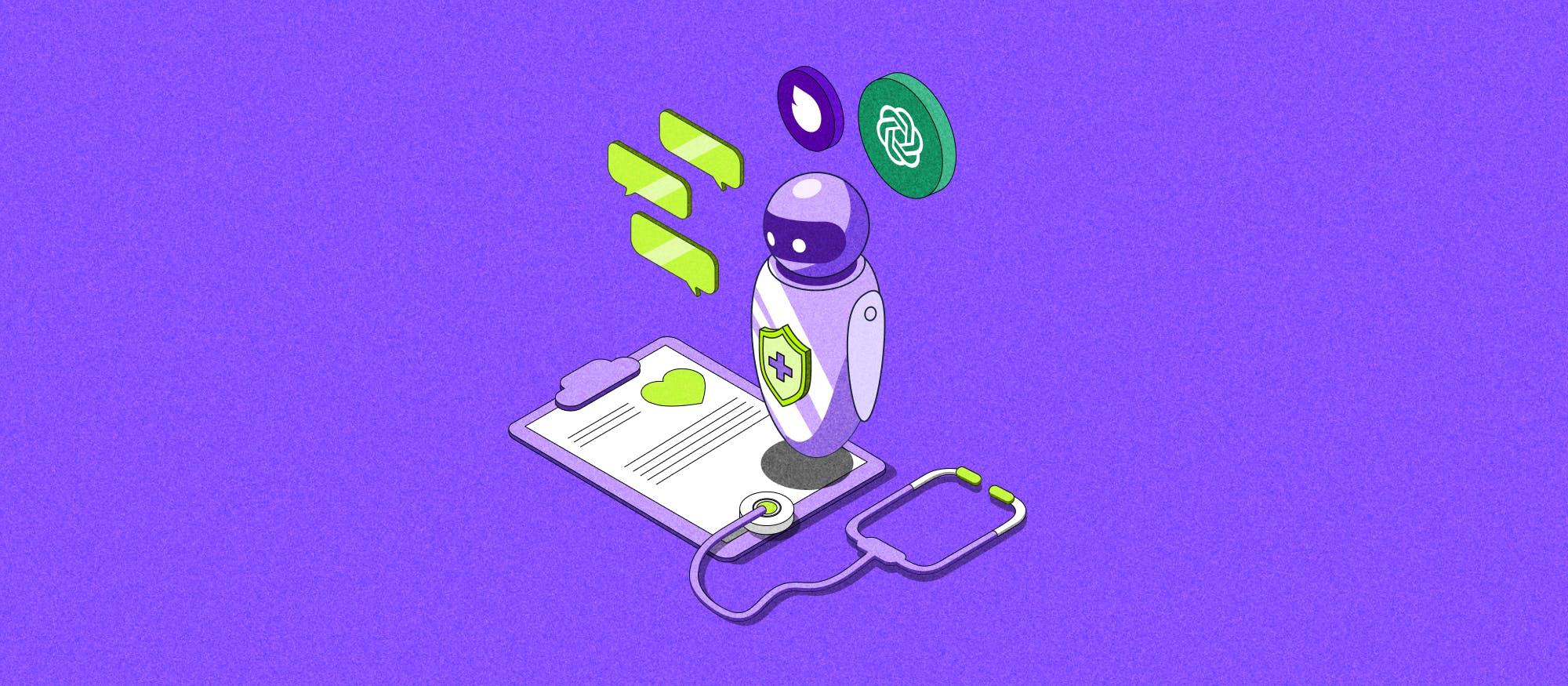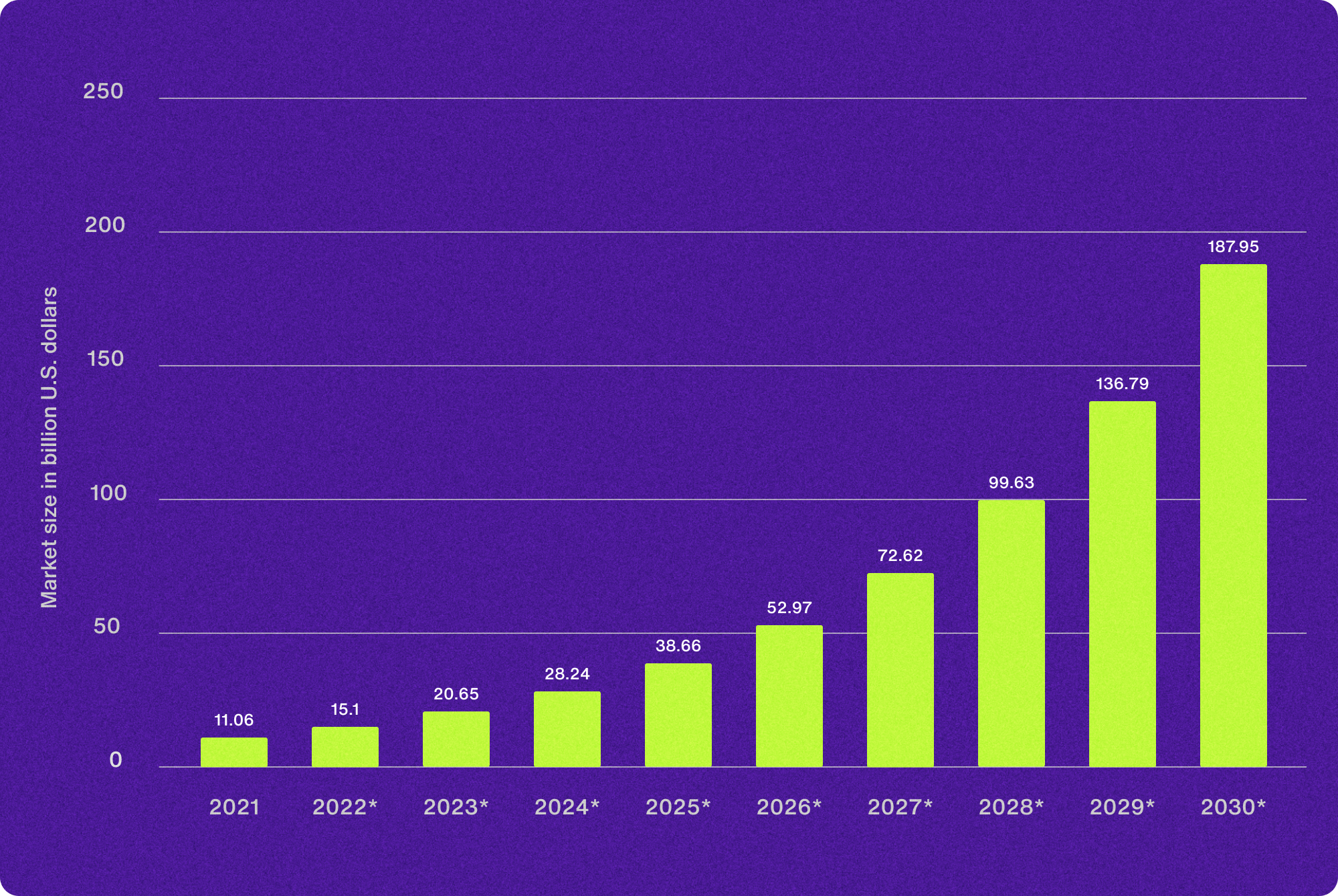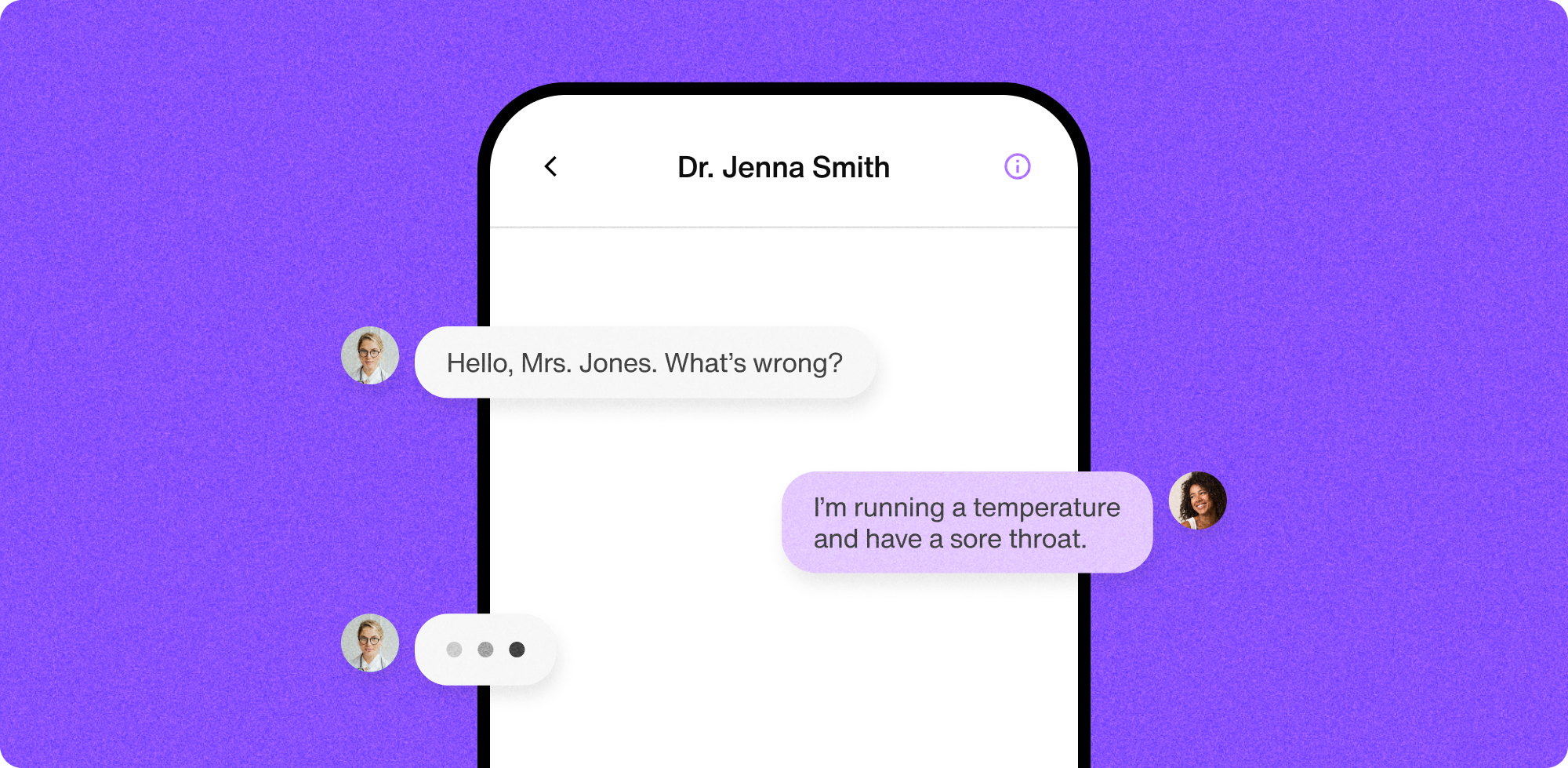Your guide to healthcare AI: The role of AI in medicine

The rise of AI in medicine
In recent years, the intersection of technology and most industries has become increasingly significant as the application of artificial intelligence (AI) becomes more and more widespread.
We can already see artificial intelligence in ecommerce helping with everything from personalization to streamlining internal processes, optimizing customer experiences, and even supporting creative endeavors like advertising and marketing!
We’ve reached a point where using AI in healthcare effectively can similarly help providers, admin and support staff, and patients themselves.
Here’s what anyone managing the patient-provider experience needs to know about the applications of AI today, as well as how to use Sendbird to launch secure messaging for healthcare.
What is healthcare AI?
Healthcare AI is a burgeoning field that harnesses the power of various elements of AI — namely natural language processing (NLP) and machine learning — to boost both provider services and patient care.
How can AI help in medicine? Healthcare AI relies on smart algorithms and other complex systems to somewhat mimic human intellect. With this intellect, it handles manual and repetitive tasks (think appointment scheduling) as well as data-heavy jobs (think compiling years of charts to come up with a diagnosis) quickly and with a high level of accuracy.
AI for healthcare frees up medical professionals and staff to spend their very valuable and limited time elsewhere. Like with patients!
How is AI used in healthcare? 7 examples of the role of AI in healthcare today
Is AI for healthcare really already as prominent as we’re making it seem?
Absolutely.
In 2021, the worldwide market size for artificial intelligence-powered healthcare was already worth over $11 billion USD.
And by 2030, that valuation is projected to hit nearly $188 billion!

That’s impressive growth for AI in healthcare! This means we’re excited to see an explosion in how doctor’s offices, hospitals, pharmaceutical companies, and beyond apply AI in their operations.
But for now, let’s focus on where AI is most commonly being used in various healthcare applications.
1. AI chatbots deliver improved communication & experience
Are any of us really surprised to learn that over 80% of patients say poor communication is the absolute worst part of their interactions with healthcare providers?
Doctors struggling with their workloads often don’t have much time to commit to patients who are overwhelmed with questions, which makes for a very poor and scary experience for people receiving care.
Ironically, introducing healthcare AI to help automate parts of your workflow and take them off your plate can actually improve patient communication and experiences, not hurt them.
That’s because more than 60% of patients are comfortable with AI-powered nurse assistants.
Why? Because they prioritize getting answers about medications and other medical questions around the clock.
Always-on, digital nurse assistants — aka, smart AI chatbots — are a perfect example of where AI steps in to handle the more repetitive and manual elements of medical care. Basic questions can be answered immediately, meetings can be scheduled automatically, and more advanced issues can be directed to medical personnel for personalized attention. Sendbird has a fantastic AI healthcare chatbot, powered by ChatGPT, which can do this.
2. In-app chat hosts critical virtual care
Virtual medical care is becoming a standard service that people expect.
Not prepared to offer virtual consultations? You may be at risk of missed appointments and losing patients to competing providers.
Sendbird offers conversational AI-powered communication software that can easily be added to your healthcare app to facilitate secure patient messaging via chat, voice, and video. Host group or one-on-one chats, rely on notifications and alerts to ensure no message is ever missed and integrate with your existing systems to add much-needed context to every conversation.

Use Sendbird to make patient care fast, convenient, and personalized with HIPAA-compliant in-app conversations that create a thoughtful patient journey.
See how Accolade, one of Forbes’ most promising U.S. companies, improved their health and benefits solutions experience using Sendbird.
3. Deep data processing makes for more accurate diagnoses in healthcare AI
When used in the diagnosis process, healthcare AI could make a world of difference in both treatment costs and, more importantly, outcomes.
To simplify, AI can be used to collect and process health data at an amazing rate. With enough training, it can identify patterns that lead to accurate diagnoses — sometimes even better than humans can.
For example, a research group found that a trained AI program was able to spot skin cancer and diagnose it accurately at a higher rate than dermatologists.
But of course, there’s still plenty of need for human doctors in medicine.
MIT found that a hybrid approach of doctors working alongside AI to diagnose conditions based on chest X-rays had the best outcomes.
4. Smart imaging increases CT scan precision
AI may also become more critical in radiology departments for improving efficiency without sacrificing precision.
Philips has developed several AI tools, one of which assists radiologists in fast yet accurate patient positioning during CT scans, which makes for less radiation exposure and more accurate imaging. Another helps with image reconstruction, giving practitioners more readable images while also requiring patients to spend less time exposed to radiation.
5. Healthcare AI makes drug safety monitoring more approachable
Pharmacovigilance is the term for identifying and working to fix adverse effects related to medicine or vaccines. And Selta Square is one company that’s applying healthcare AI to help automate the pharmacovigilance process.
With innovation like this, the traditional resource-intensive process of drug safety monitoring may become a much lighter lift. That’s good news for pharmaceutical producers, the consumers who rely on them, and their healthcare providers.
6. Anomaly recognition boosts monitoring & preventative care
One really interesting thing about healthcare AI is that it can provide a second set of eyes of sorts for busy doctors by pointing out anomalies in data.
Healthcare AI algorithms trained on the same brain images over time to spot neurological developments have been found to help physicians catch and diagnose brain conditions faster and with increased accuracy.
Healthcare AI has also been applied to lung nodule detection, where it proved to search faster and detect nodules more accurately than manual inspections did.
When you think of the patient load that most healthcare providers are dealing with today, the monitoring and prioritization that AI provides can make a big difference in getting patients the care they need to halt or slow disease progression.
7. Automation improves healthcare administration efficiency
The paperwork and other administrative tasks that healthcare staff deal with takes a lot of time. And, the stack only seems to grow bigger by the year.
Thankfully, many of those repetitive to-dos can be completed more quickly and accurately with the aid of AI-powered automation.
Generative AI, for instance, can assist with taking, summarizing, and exporting notes to ensure that medical records are as comprehensive as possible. Healthcare AI can also be helpful in making the extremely tedious coding and billing process faster and more reliable by removing human-induced duplication and errors.
With AI aiding staff to be more efficient in healthcare administration, they can free up time for meaningful interactions with patients and doctors.
Healthcare AI & patient privacy: A developing situation
The truth is that as the use of technology in healthcare increases, so do privacy concerns.
And that's mostly because today’s policy isn’t able to advance fast enough to fully safeguard all of the personal data that is required to make healthcare tech and AI tick.
But at Sendbird, we aren’t interested in exploiting this deficiency or blaming a lack of security on outdated legislation. After all, one of our core values is “the buck stops here.”
That means we take responsibility for keeping the data that comes into our system private and secure.
As part of that, not only is our in-app messaging HIPAA compliant, we also offer HIPAA compliant AI chatbot solution.
Elevate the level of care with Sendbird’s AI chat for healthcare
Create better health outcomes, build patient loyalty and referrals, and cut down on provider and staff burnout with AI-powered messaging from Sendbird. With Sendbird’s in-app customer communication solutions, you can deliver context-rich patient-centric communication, including feature-rich AI-powered in-app messaging, AI healthcare chatbot and notifications that proactively notify patients at every stage of the patient journey.
Sign up to try Sendbird for free and immediately enjoy access to intuitive tools that will elevate your patient communications and improve patient outcomes with mobile conversations. If you have questions, start a discussion on the Sendbird Community, or contact us to talk to an expert!









